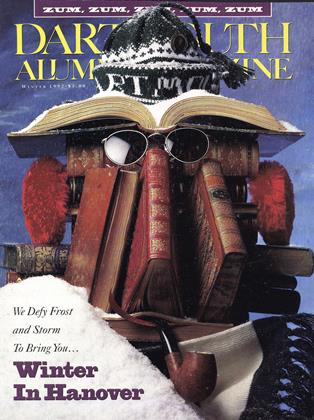ESSENTIALLY, the location of the library becomes irrelevant," said Nancy Hossfeld, who manages Dartmouth's computer network. "There isn't anything you can put on computers that you can't port through the net to any room on campus." Soon people will stop thinking about specifically where information resides. Instead, they'll be worrying about how to access it or whom they have to consult to get it. "Sure, the building is nice and all—it's the symbol of the College, really," Hossfeld said. "But in the future it will serve more of an information-storing role than an information-accessing role."
Dartmouth's approach is far more cautious, at least so far. "There will always be a need for physical places," Hossfeld conceded. "I can't imagine ever going completely to an electronic medium, although some people probably will try. There are some dimensions of learning that you can't really grasp without touching."
The library-without-walls concept, or at least the Dartmouth hybrid of it, is largely designed to increase access, not to eliminate the need for the printed word. "You want to make sure you're making it available to as many people as possible. That's what makes Dartmouth unique—that philosophy-making it available to as many people as you can," said Hossfeld. Most rooms on campus are hard-wired with cables connecting the campus to Kiewit's central file servers, computer storage devices available to any connected computer. In addition to the traditional academic purposes, computers at Dartmouth serve other information needs. Stock quotations are now available, as well as weather information for practically any city in the world. These services are also increasingly accessible to the average Joe, or at least the average Joe with a computer and a telephone modem. Several private firms have started up their own versions of information services that can be dialed up over the phone system. Users of Comp-u-Serve, GEnie, Prodigy, and Dow Jones News Retrieval pay monthly charges ranging from $6 to $45. The services, available in areas as rural as Hanover, provide stock quotations, airline schedules (and reservations!), instant wire-service news, product support from hundreds of computer companies, and literally hundreds of other amenities. The emphasis is much less on academia, not surprisingly, and more on everyday tasks like finding out what the weather will be like when you touch down in Somalia.
Acknowledged as the ugliest buildings on campus, Gerry and Bradley will bite the dust.
 View Full Issue
View Full Issue
More From This Issue
-
 Feature
FeatureKnow Your Place
December 1992 By George J.Demko -
 Feature
FeatureCure1 For The Common Cold2 Proven3 At Dartmouth4!
December 1992 By TIG TILLINGHAST '93 -
 Cover Story
Cover StoryThe Library Culture
December 1992 -
 Cover Story
Cover StoryRethinking The Stacks
December 1992 By Tig Tillinghast '93 -
 Cover Story
Cover StoryWith Hard-bound Books, Who Needs Digital?
December 1992 -
 Cover Story
Cover StoryTechnology Now and in the Future
December 1992
Features
-
 Feature
FeatureThe Education of a Freshman
May 1955 -
 Feature
FeatureA TASTE FOR CHANGE
NOVEMBER 1963 -
 Feature
FeatureFive Wishes for America
By BENFIELD PRESSEY -
 Feature
FeatureTo Screenwriting Born
November 1982 By Budd Schulberg '36 -
 Feature
FeatureOn the Record
Mar/Apr 2005 By LISA FURLONG -
 Feature
FeatureArt Imitates Life
MAY | JUNE 2017 By LISA FURLONG


